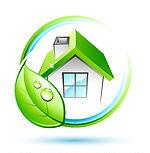|
|
|
|
 
- Bring Your Bags- Between a billion and a trillion plastic bags are used every year worldwide. As many as billion of them end up as litter. Paper bags may be worse; one paper bag takes more energy to make and creates more waste than two plastic bags.
- Switch to recycled paper products. If every household in the United States replaced just one four-pack of 400 sheet virgin fiber toilet paper with 100 percent recycled ones, we would save:
- 1,450,000 trees
- 3.7 million feet of landfill space equal to 5,500 full garbage trucks
- 523 million gallons of water: a year’s supply for 4,100 families of four, and
- avoid 89,000 pounds of pollution.
- Use Non-Toxic Cleaning Products- The products we buy to keep our homes clean are a source of poisonous chemicals – toxins that cause cancer, asthma, and other lung problems. For about $20 you can replace every cleaning product in your house with a safer, non toxic, biodegradable homemade version using common ingredients like baking soda, club soda, vinegar and salt. Find recipes at www.eartheasy.com
- Get rid of Junk Mail. The average adult is on at least 50 mailing lists, resulting in about 40 pounds of mail sent our way each year. And we forward nearly half of it to the landfill unopened.
![C:\Documents and Settings\TEMP.MAIN.008\Local Settings\Temporary Internet Files\Content.IE5\K7YM9VJK\MC900437340[1].jpg](energy-saving-tips_clip_image005.jpg) Cancel catalogs at www.catalogchoice.org Cancel catalogs at www.catalogchoice.org
Cut down on junk mail (fliers and envelopes, rather than catalogs). Call 888-5optout.
- Telecommute- By telecommuting just two days per week, over the course of a year an employee will drive 3,000 fewer miles, save approximately $430 in gas, and eliminate 3,120 pounds of CO2 emissions.
- Cancel your printed newspapers and magazines and subscribe to the on-line versions. It takes a lot of energy to make the paper, print and deliver these publications to your door.
![C:\Documents and Settings\TEMP.MAIN.008\Local Settings\Temporary Internet Files\Content.IE5\K7YM9VJK\MP900401881[1].jpg](energy-saving-tips_clip_image007.jpg) Cook with small appliances. Cook with your toaster oven, electric skillet and slow cooker for specialized jobs, rather than the range. Small appliances use less energy. Cook with small appliances. Cook with your toaster oven, electric skillet and slow cooker for specialized jobs, rather than the range. Small appliances use less energy.
- Purchase an ENERGY STAR model when buying a new refrigerator or freezer, look for the ENERGY STAR label. ENERGY STAR refrigerators and freezers can save you hundreds of dollars on your electric bill over the life of the appliance. Remember, older refrigerators and freezers use two to three times more electricity than ones that are 10 years old or less.
- Only use one refrigerator or freezer. You can spend up to $120 in electricity per year using a second refrigerator or freezer. If you need to during holidays or for special occasions, turn it on one or two days before you need it.
- Always wait until you have a full load before running your dishwasher. Full loads use the same amount of hot water and energy as smaller loads. You run fewer loads and save energy.
![C:\Documents and Settings\TEMP.MAIN.008\Local Settings\Temporary Internet Files\Content.IE5\19U06ZS1\MC900437369[1].jpg](energy-saving-tips_clip_image009.jpg)
- Don’t peek in the oven. Resist the urge to open the oven door while baking. Every time you peek, the temperature drops 25° F and requires additional energy to bring the temperature back up.
- Wash laundry in warm or cold water. Washing laundry with warm or cold water works your water heater less. Use hot water only when the greatest cleaning is needed.
- Don’t dry clothes excessively. Drying laundry excessively uses more energy than is needed, and is hard on fabrics. If you purchase a dryer, get one with an electronic sensor that shuts off the dryer when clothes are dry.
- Clean the lint filter. After each load, clean the filter to keep the dryer running efficiently. Also, periodically check the air vent and hose for clogging. Keeping the air vent and hose free of lint prevents a fire hazard.
 Purchase an energy-efficient Water Heater model. The initial cost may be more but operating costs are less in the long run. Consider a tankless or instantaneous water heater, which uses energy only when hot water is needed, rather than maintaining 40 gallons or more of hot water all the time. Purchase an energy-efficient Water Heater model. The initial cost may be more but operating costs are less in the long run. Consider a tankless or instantaneous water heater, which uses energy only when hot water is needed, rather than maintaining 40 gallons or more of hot water all the time.
- Repair dripping faucets promptly. If the faucet leaks hot water, the energy used to heat it is costing you money. (One drop a second can waste up to 48 gallons a week!)
- Install water saving devices. Use low-flow showerheads on all showers and faucet aerators on all faucets to reduce your hot water use.
- Use humidifiers/dehumidifiers. Humidity makes you feel warmer in colder months. With the proper humidity level, you’ll be able to turn your thermostat down to a lower temperature, save energy and still feel comfortable. About 20 percent to 40 percent relative humidity is recommended. Use a dehumidifier in warm, humid months. Less humidity helps you feel cooler, allowing you to use a higher air conditioner setting to save energy. A dehumidifier works best when air can circulate freely through it. Place it away from walls and bulky furniture.
![C:\Documents and Settings\TEMP.MAIN.008\Local Settings\Temporary Internet Files\Content.IE5\19U06ZS1\MC900437634[1].png](energy-saving-tips_clip_image013.gif)
- Use ENERGY STAR compact fluorescent light bulbs. These compact fluorescent light bulbs last longer and use up to 75 percent less energy than standard light bulbs. You can cut your electric bill by $60 per year if you replace the standard bulbs in your five most frequently used light fixtures. Properly dispose of compact fluorescent light bulbs at your local household hazardous waste collection site.
- Avoid long-life incandescent light bulbs. Long-life incandescent light bulbs are the least efficient of the incandescent bulbs.

- Use natural lighting. Open curtains and shades during the day instead of using lighting. Consider skylights and solar tubes during remodeling or new construction design. This allows the maximum use of natural daylight.
- Turn off lights. Turn off lights when not in use, even for short periods of time. Turning lights off and on uses less energy than if they are left on all the time.
- Cool only the rooms in use. Close unused rooms to keep cooled air in areas where it is most needed.
![C:\Documents and Settings\TEMP.MAIN.008\Local Settings\Temporary Internet Files\Content.IE5\K7YM9VJK\MP900305825[1].jpg](energy-saving-tips_clip_image017.jpg)
- Don’t make more heat. Delay chores that produce heat and moisture until the cooler parts of the day or evening. Limit dishwashing, laundering and cooking on hot, humid days. These activities make your room more uncomfortable and require your air conditioner to work harder.
- Use ceiling fans for air circulation. In hot weather, set the ceiling fan direction to blow air down. The air moving across your skin creates a cooling effect, allowing you to raise the temperature on your thermostat and still feel cool. In cold weather, set the fan to blow toward the ceiling. This pushes warm air away from the ceiling and evenly distributes heat in the room.
|
|
|
|
|
|
|
|